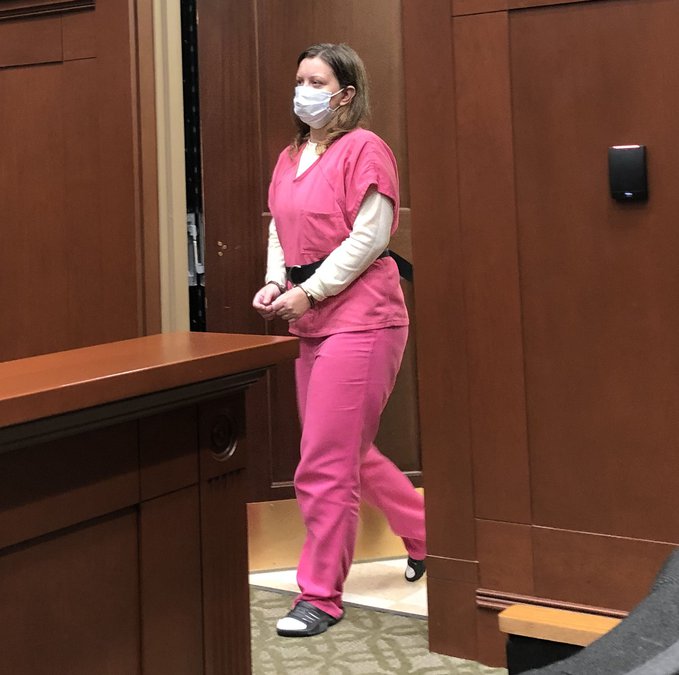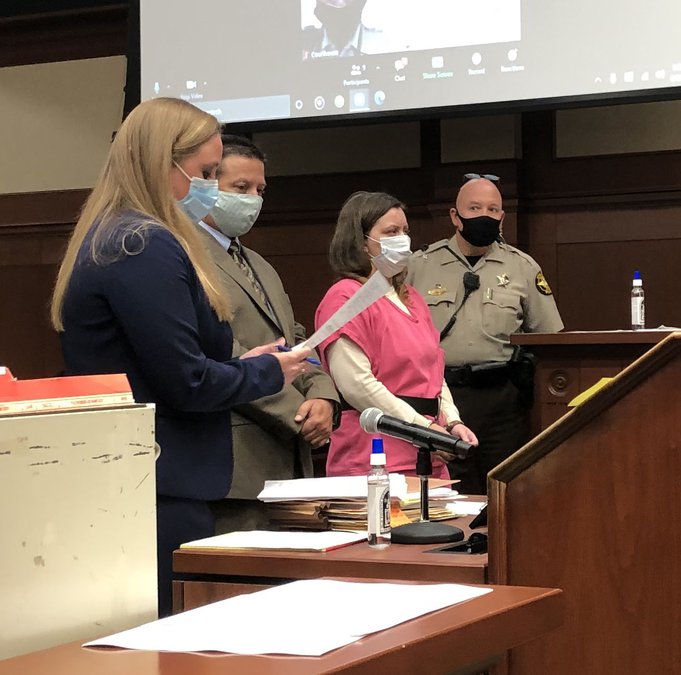COVINGTON, Ga. — An Oxford woman is going to prison for 15 years after pleading guilty to shooting her 2-year-old daughter to death but being mentally ill at the time.
And the district attorney said prosecutors got a tougher sentence than one they potentially could have seen under state law.
Jennifer Michelle Bellah, 33, today, Aug. 26, pleaded Guilty but Mentally Ill to a charge of felony murder in the 2018 shooting death of her daughter, Natalya Bellah.
Superior Court Judge Ken Wynne Jr. sentenced her to 15 years in prison without the possibility of parole, followed by life on probation.
Deputy Chief Assistant District Attorney Amber Dally and Chief Public Defender Anthony Carter said her plea was the result of an agreement between Bellah and prosecutors. Bellah's family and the Newton County Sheriff’s Office lead investigator on the case also were in agreement, they said.
Bellah entered her plea today after pleading not guilty to the charges in May 2019.
The case stems from the Aug. 28, 2018, shooting death of Bellah’s daughter in the basement of a residence on Brown Thrasher Run near Oxford that they shared with the girl’s grandmother.
At the time, a Newton County sheriff’s spokesman said Bellah called 911 to report she “shot her 2-year-old daughter using a firearm.” The girl was pronounced dead once authorities arrived, the spokesman said.
Assistant District Attorney Amber Dally today said Bellah was being treated for mental illness and had asked for an increase in the dosage of prescription anti-depressants in days leading up to the shooting.
On the day of the incident, Dally said Bellah left a voice mail on her brother’s phone saying she was upset, that “he would never know what it’s like to lose a child,” and referred to Natalya in “the past tense.”
However, when he went to check on them Bellah refused to let him in the home but showed him through a window the girl was unharmed. Soon after, she retrieved a handgun, shot the girl three times and called 911, Dally said.
A pistol, a shell casing and bullets were recovered from the scene, a sheriff’s office spokesman said in 2018.
Dally today said investigators found the prescription anti-depressants, medical records about her ongoing treatment and “eulogies” Bellah had written for her and her daughter.
She said Bellah told investigators she shot and killed the child because she feared the girl would be taken from her and later harmed.
“We do agree she did suffer some sort of mental illness” which justified her use of the plea of guilty but mentally ill, Dally said.
Carter, who represented Bellah, said he fought for her to plead Not Guilty by Reason of Insanity but called today’s agreement “a good compromise.”
Acting District Attorney Randy McGinley said, “The death of Natalya was a horrendous crime and this plea and sentence ends the case with the appropriate outcome.”
McGinley said that, in addition to the more common guilty and not guilty pleas, state law allows a defendant to plead Guilty but Mentally Ill or Not Guilty by Reason of Insanity.
“Should this case have gone to trial, a jury would have been given all four of those options,” McGinley said.
“When a jury finds a defendant Not Guilty by Reason of Insanity, the defendant is committed to a state mental health facility. The defendant is then evaluated within 30 days and then on a regular basis, usually every 12 months.
“Should an evaluation find that a defendant no longer meets the requirements of inpatient commitment, that defendant would be released from commitment by the court,” McGinley said.
“Therefore, under a finding of Not Guilty by Reason of Insanity, a defendant can be released from commitment in a very short time after such a verdict. This could happen as early as shortly after the first evaluation 30 days after the verdict.”
He said when a defendant enters a plea of Guilty but Mentally Ill or such a verdict is returned by a jury, the Georgia Department of Corrections will be responsible for the defendant’s mental health needs.
“Therefore, a defendant under this plea or verdict is sentenced to prison but will receive mental health treatment while in prison,” McGinley said.
He said Bellah was evaluated by “multiple doctors” while the case was pending.
“Should the case had proceeded to trial, all these mental health experts would have testified that Bellah was suffering from a serious mental health illness,” he said.
“While that was undisputed, some of the experts would have disagreed at trial as to whether Bellah met the legal requirements for a finding of Not Guilty by Reason of Insanity.”
He said his office “thoroughly reviewed all of the facts surrounding this case including all of the mental health evaluations, the body camera footage, and the interviews of the defendant and her family members conducted just after the crime.” “Additionally, the DA’s office consulted with an additional well-known and well-respected experts to review the mental health issues,” he said.
“After this exhaustive review of the case” the state and the defense reached a negotiated plea to Guilty by Mentally Ill with the sentence that Wynne accepted, McGinley said.









